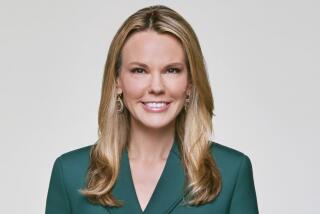Warning: Inhaling CBS Story May Be Hazardous to . . .
- Share via
Beware of secondary smoke.
It turns out that there was more to the “60 Minutes” tobacco tale than initially met the lungs. Latest word is that the upfront, hold-nothing-back, won’t-be-gagged, pugnaciously candid, ever-earnest-and-trustworthy CBS News magazine omitted just a little bit from its Nov. 12 tell-all concerning the network’s lawyers squelching a “60 Minutes” interview with an unnamed former Brown & Williamson executive said to have made damaging revelations about the tobacco giant regarding public health.
On that program, Mike Wallace said how “dismayed” he and his “60 Minutes” colleagues were that CBS lawyers had killed the interview because of a “perceived” threat that an epic lawsuit could be filed against the series on grounds that it had induced the interviewee to break a confidentiality pact he had signed with his former employer.
This seemingly obscure legal fine point was viewed skeptically in some circles, for no one could recall a news organization ever being targeted in such litigation, making it seem highly unlikely that it would happen to CBS as a result of this interview.
Instead, suspicious eyes ogled other potential motives for pulling the interview, for no less than the free-speech principles of the First Amendment appeared to be at stake here.
One scenario had CBS Chairman Laurence Tisch vetoing it because of his family’s controlling interest in another tobacco company, Lorillard Inc. What harms one tobacco company--when it comes to disclosures of the impact of cigarette smoking on public health--harms all of them.
Another scenario had the interview being aborted by top CBS executives who feared a multibillion-dollar lawsuit would undermine the company’s pending merger with Westinghouse Electric Corp.--since endorsed by CBS stockholders--from which the executives stood to profit in the millions.
Although sheer speculation, these theories were legitimate speculation, based on information of the moment. Incomplete information, as it turned out.
What “60 Minutes” had neglected to mention in its Nov. 12 story about the tobacco story that was killed was that CBS had promised the former Brown & Williamson employee that it would pay his costs resulting from any libel suit against him as a result of the interview, something Wallace later said he was unaware of. (If so, he was curiously out of the loop here, despite his reputation for being the “60 Minutes” correspondent most directly involved in the stories he reports.)
Nor did “60 Minutes” reveal that it had paid the man $12,000 as a consultant for the program’s 1994 report on the fire dangers of smoking.
Some legal experts say that the above two factors would have increased the network’s vulnerability in any lawsuit alleging that it induced the executive to breach his confidentiality contract with Brown & Williamson. Hence, from legal and fiscal perspectives, killing the interview may have been justified.
Moreover, it also turns out that the former tobacco executive was promised by “60 Minutes” producer Lowell Bergman that it would not air the interview without his permission, something he did not grant, according to his lawyer. (Bergman said he had not been asked for permission yet because the story hadn’t been completed.)
Of course, much of this dispute centers on the kind of obtuse lawyerspeak that even legal experts don’t agree on. Nor do the latest revelations detract from the increasing danger of today’s media being intimidated by tobacco companies that may aggressively respond with all their overwhelming litigious might to anti-smoking news stories, even when those stories are essentially correct.
Or detract from the increasing prospect of conflicts of interest during these times of incestuous corporate sprawl, in which those influencing the courses of news organizations may have close ties to people and industries that are the potential subjects of media coverage.
In fact, the mere perception of conflict of interest can taint credibility.
What this TV debacle speaks to more directly, though, is that even while hoping to disclose alleged dishonesty by the tobacco industry, “60 Minutes” itself was being deceptive through its omission of those tidbits about its relationship with the interviewee.
Whatever the rationale for its actions, whatever the secret subtext that may underlie this controversial slice of “60 Minutes,” the outcome is . . . well, dismaying.
* RELATED NEWS: F2 (Morning Report)
More to Read
The biggest entertainment stories
Get our big stories about Hollywood, film, television, music, arts, culture and more right in your inbox as soon as they publish.
You may occasionally receive promotional content from the Los Angeles Times.










